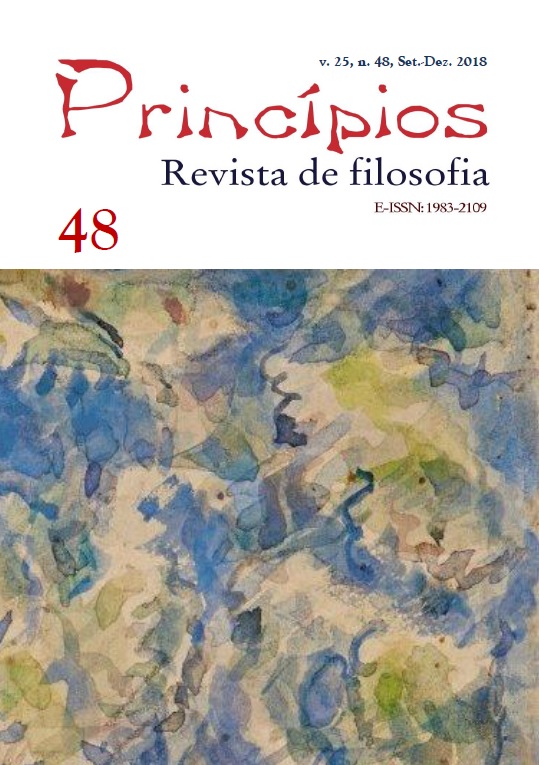Theory of power as a theory of citizenship
a reading of Aristotle's Politics inspired by Hannah Arendt
DOI:
https://doi.org/10.21680/1983-2109.2018v25n48ID13747Keywords:
Politics, Commom interest, Stability, Plurality, Mixed regimeAbstract
The essay aims to accomplish a reading of Aristotle's Politics (?????????) from an interpretive key suggested by Hannah Arendt. The idea is to understand Aristotle's proposal of the city's foundation (?????) in the citizen category (???????). To explain this path, we follow Arendt's suggestion of interpreting the common interest (????? ????????) as living together. This direction led us to change the understanding of the best regime (??? ??????? ?????????) for the city. The Aristotelian change from the perfect and excellent regime (??????? ?????????) to the stability (????????) of the city. This turn took place when Aristotle perceived the common life as essentially plural. The assimilation of the various parts of the city into the regime, that is, the distribution of power is one of the main conditions for achieving stability. The regime identified by Aristotle that best represents this perspective is the mixed regime; subject to be approached in the latter part of this essay.
Downloads
References
AGUIAR, O. A. A amizade como amor mundi em Hannah Arendt. O que nos faz pensar – Departamento de Filosofiia da PUC-Rio. Rio de Janeiro, v. 19, n. 28, dez. 2010, p. 131-144.
AQUINAS, T. Commentary on Aristotle’s Politics. Cambridge: Hackett, 2007.
ARENDT, H. A condição humana. Trad. Roberto Raposo. 11 ed. Rev. e Apres. Adriano Correia. Rio de Janeiro: Forense, 2010.
ARENDT, H. A grande tradição. Trad. P. E. Bodziak Jr. e A. Correia. O que nos faz pensar – Departamento de Filosofiia da PUC-Rio. Rio de Janeiro, v. 20, n. 29, maio 2011, p. 273-298.
ARISTÓTELES. Ética a Nicômaco. Trad. Leonel Vallandro e Gerd Bornhem. São Paulo: Abril, 1979. p. 45-236. (Coleção Os Pensadores).
ARISTÓTELES. Política. Ed. bilíngue. Trad. Antônio Campelo Amaral e Carlos Gomes. Lisboa: Vega, 1998.
AUBENQUE, P. A prudência em Aristóteles. Trad. Marisa Lopes. São Paulo: Discurso, 2003.
AUBONNET, J. Introduction. In: ARISTOTE. Politique. Paris: Les Belles Lettres, 2002. p. VII-CCVI.
BARKER, E. Introduction. In: ARISTOTLE. The Politics of Aristotle. Oxford: Oxford University Press, 1962. p. XI-LXXVI.
BARRERA, J. M. El comentario de Santo Tomás a la Política de Aristóteles: un análisis desde el proœmium. Veritas. Porto Alegre, v. 51, n. 3, set. 2006, p. 15-49.
BODÉÜS, R. Política ou a arte do mal menor. In: BODÉÜS, R. Aristóteles, a justiça e a cidade. São Paulo: Loyola, 2007. p. 81-99.
LEÃO, D. F. Introdução. In: ARISTÓTELES. Constituição dos atenienses. Lisboa: C. Gulbenkian, 2003. p.1-17.
MACINTYRE, A. Dependent rational animals: why human beings need the virtues. Chicago: Open Court, 1999. (The Paul Carus Lectures Series, 20).
MILLER JR., F. D. The Polis as human product. In: MILLER JR., F. D. Nature, justice, and rights in Aristotle’s Politics. New York: Oxford University Press, 1995. p. 45-56.
NEWMAN, W. L. Introduction to the Politics. In: ARISTOTLE. The Politics of Aristotle (Vol. I). Ed. W. L. Newman. New York: Cambridge University, 2010.
NUSSBAUM, M. A fragilidade da bondade. São Paulo: M. Fontes, 2009.
ORTEGA, F. Para uma política da amizade: Arendt, Derrida, Foucault. Rio de Janeiro: Relume-Dumará, 2000.
WARD, Ju. K. Aristotle on phúsis: human nature in the ethics and politics. Polis: The Journal of the Society for Greek Political Thought. v. 22, n. 2, 2005, p. 287-308.
ZINGANO, Marco. Natural, ethical, and political justice. In: DESLAURIERS, M.; DESTRÉE, P. (Ed.). The Cambridge companion to Aristotle’s Politics. Cambridge: Cambridge University Press, 2013. p. 199-222.
Downloads
Published
How to Cite
Issue
Section
License
Authors retain copyright and grant the journal right of first publication with the work simultaneously licensed under a Creative Commons Attribution License that allows others to share the work with an acknowledgement of the work's authorship and initial publication in this journal.


 Português (Brasil)
Português (Brasil) English
English Español (España)
Español (España) Français (Canada)
Français (Canada)


